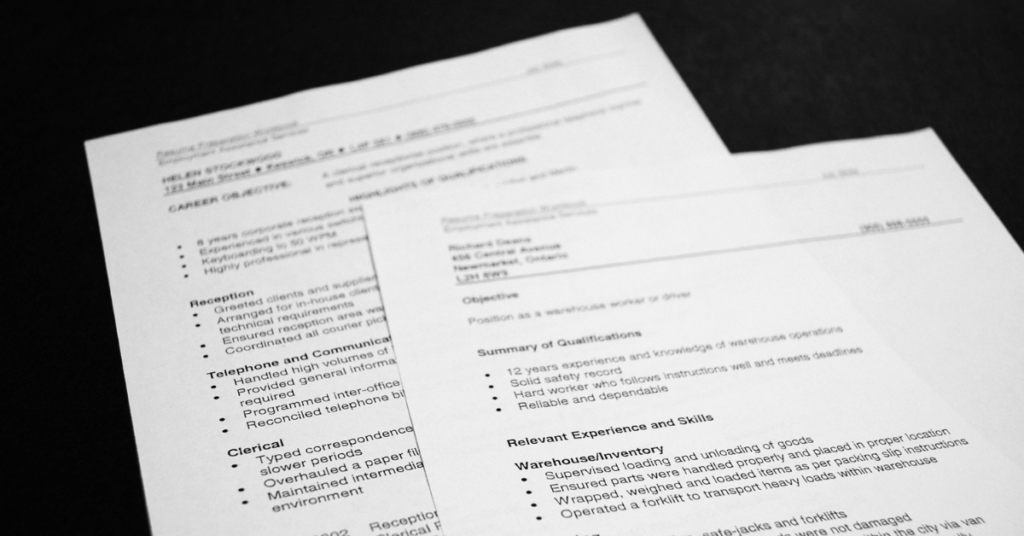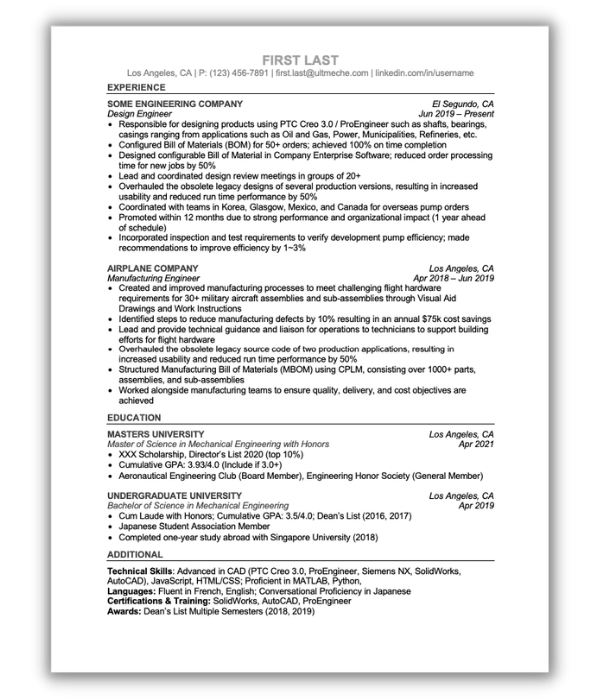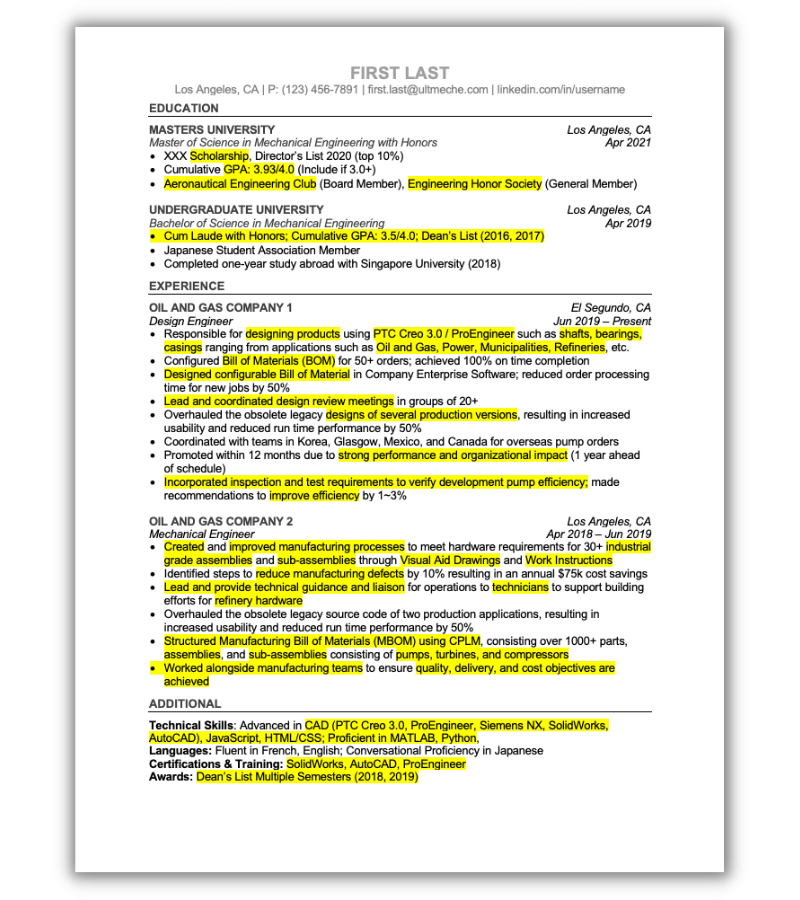No matter what stage of your career you’re in you’ll find these 11 tips for writing an engineering resume extremely helpful.
Although school is where you pick up the foundation of your engineering skills, they don’t teach you how to write a resume in school. As a result, we personally come across hundreds of job seekers that struggle to write resumes. They make so many mistakes such as not implementing these below tips for writing an engineering resume.
February 29, 2024
Start implementing the below tips in your resume writing today and you’ll see your interview rate skyrocket.
1. Use a simple format
This is not a framework just in resumes, but in all aspects of life. Simple is best.
Think about it.
As an engineer, you’re responsible for calculations – what’s easier working with simple formulas or complex ones?
We’ll take the simple method any day.
You have to understand that recruiters are only looking at your resume for a good 6 seconds.
This means that your resume format must be simple to convey your skills efficiently.
Use the sample format below to start off – it’s clear, concise, and ATS optimized – which we’ll get to the next point.

2. Ensure template is ATS optimized
What is ATS?
ATS stands for Applicant Tracking System – its the software that companies utilize in job applications. The ATS software’s purpose is to filter out candidates’ resumes and determine whether they’re prequalified for the job or not.
The ATS software looks at:
- Experience
- Education
- Keywords
As a result, you need to format your resume in a manner such that the ATS software can parse your resume.
If the ATS scanner does not pick up your resume, chances are you’re not getting the job.
3. Be clear and concise
This goes hand in hand with being simple – you need to learn how to be clear and concise.
This even applies to practicing engineering in the field.
To convey your message across others, you need to be clear and concise.
This applies for writing resumes too.
As a rule of thumb, keep your bulletpoints between 1-2 lines long. 2 lines is pushing it even.
Do not use large chunks of text in your resume – this will make your resume hard to scan quickly and the recruiter will pass over it.
4. Only include relevant information
Hobbies, volunteering, interests, etc. all make you an interesting person, but they don’t add value in your job search.
When recruiters are searching for candidates, they are not looking for interesting or personable people.
Instead, they are looking for who has the skillsets needed to do the job.
Sometimes all they look at is what year you graduated, previous employers, and whether or not you contain certain hard skills such as CAD.
5. Use keywords
As an engineer, you must know what keywords to put on your resume.
What keywords do I use on my resume?
If you don’t know the answer to this basic question?
You’re not going to get the job.
You need to understand what the hot keywords are related to your field in engineering – whether it be technical skills, core competencies, industries, etc.
How to determine what keywords to use:
Read a few job descriptions of the jobs that you’re interested in.
Those job descriptions will contain similar phrases and skillsets – these are the keywords you must use.
As an example, look at mechanical engineering resume keywords.

6. Include quantitative results and accomplishments
If it can’t be measured, it doesn’t exist – we go by this.
If you don’t have hard metrics defined through numbers, then we can’t be certain what you did even had an outcome.
As a result, it’s a red flag if someone doesn’t have quantifiable results and accomplishments on their resume.
It shows that they didn’t drive any change, have any positive business impact, and most likely just did the minimum amount of work.
Companies love it when you save money for them.
7. Don’t say what you did, say what you accomplished
Another issue that hundreds of my clients have is that they focus in on the little things way too much.
They don’t look at the big picture change.
Regarding the big picture, I’m talking about macroeconomics.
As an example:
Did you design tooling?
Or did you design tooling to support high performance aircraft carriers for the aerospace and defense industry?
Which bullet sounds better?
The one that captures the big picture change.
No one cares about tiny modifications that you make to ensure fit, form, function – they want the big picture.
It’s more attractive from a business point of view – which is what engineering is.
8. Use Project Experience
This is for those that don’t have much experience, but are trying to get jobs in engineering.
How do you get a job without experience?
Easy – you showcase your projects.
What if you don’t have any projects?
You need to get started ASAP. YouTube has plenty of resources you can use to create your own projects. You can do anything regarding robotics, coding, rockets, planes, etc.
9. Put your GPA on if above 3.0
I have a harsh truth for those that have been killing themselves for a high GPA – it doesn’t matter all too much when you get into the industry.
However, GPA does have an impact for your first job.
Hiring managers will be looking at each and every credential you have.
Ideally, as a senior student in engineering, you should have:
- Internship Experience
- Project Experience
- 3.5+ GPA
- Involvement in Engineering clubs
If you have the above, you will have no issues finding a job from a background standpoint.
If you have the above and you are struggling to find a job? It’s 100% your resume that is the issue.
10. Save as PDF
This is one of those small details that no one talks about.
Make sure you save your resume as a PDF when you submit it in the job application.
Why do I need to save my resume as a PDF?
Microsoft Word Docs have the capability to get corrupt.
Depending on what type of OS you’re using on your computer – Windows, Mac, Linux, etc., the formatting can get corrupt.
Mitigate any risk regarding file corruption by uploading your resume as a PDF.
11. Keep a general template
For maximum job search efficiency, you will want to be using a general template that you’ll be using to apply to as many jobs as possible.
Job hunting is a numbers game – you’re going to have to apply to many employers for a chance to get calls back.
Even if you use my services.
However, our services have been instrumental in getting engineers jobs.
If you have the time and you really want a specific job, I recommend tailoring your resume to that specific job.
This is if you have the time and you want to ensure that you’ve maximized specific keyword capturing.
Closing
Use these tips for writing an engineering resume and watch your job search efficiency skyrocket.
You will get calls from recruiters and interviews set up.
As a result, you will get more job offers using these frameworks.
These are simple, yet highly effective frameworks you can use in your job search starting today!
All it takes is a few hours to implement these and craft yourself a killer resume.
Do you have any other tips for writing an engineering resume? Let us know!
Check out our career services.
Wanna read about the best engineering resume writer?
Check out: The Best Engineering Resume Writer
About the author

Kazuyoshi Fujimoto, PE
Founder | Engineering Career Coach | Principal Mechanical Engineer
Kazu oversees all of ultmeche’s engineering services. He provides consulting such as resume reviews, rewrites, mock interviews, and all services career related. Additionally, Kazu performs consulting work regarding Oil & Gas, Automotive, and Aerospace & Defense. Kazu is licensed as a professional engineer in the state of California and has 9+ years of experience in Oil & Gas, Automotive, and Aerospace & Defense.

3 thoughts on “11 Tips for Writing An Engineering Resume”